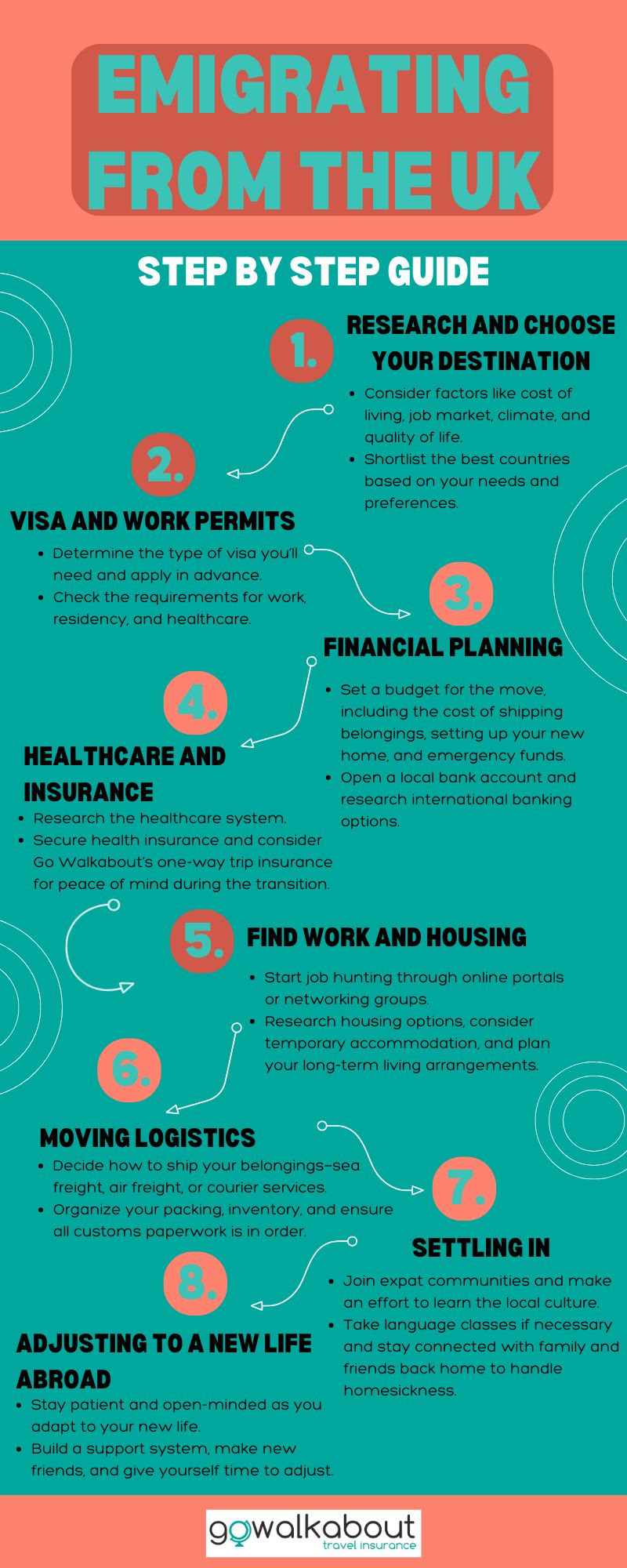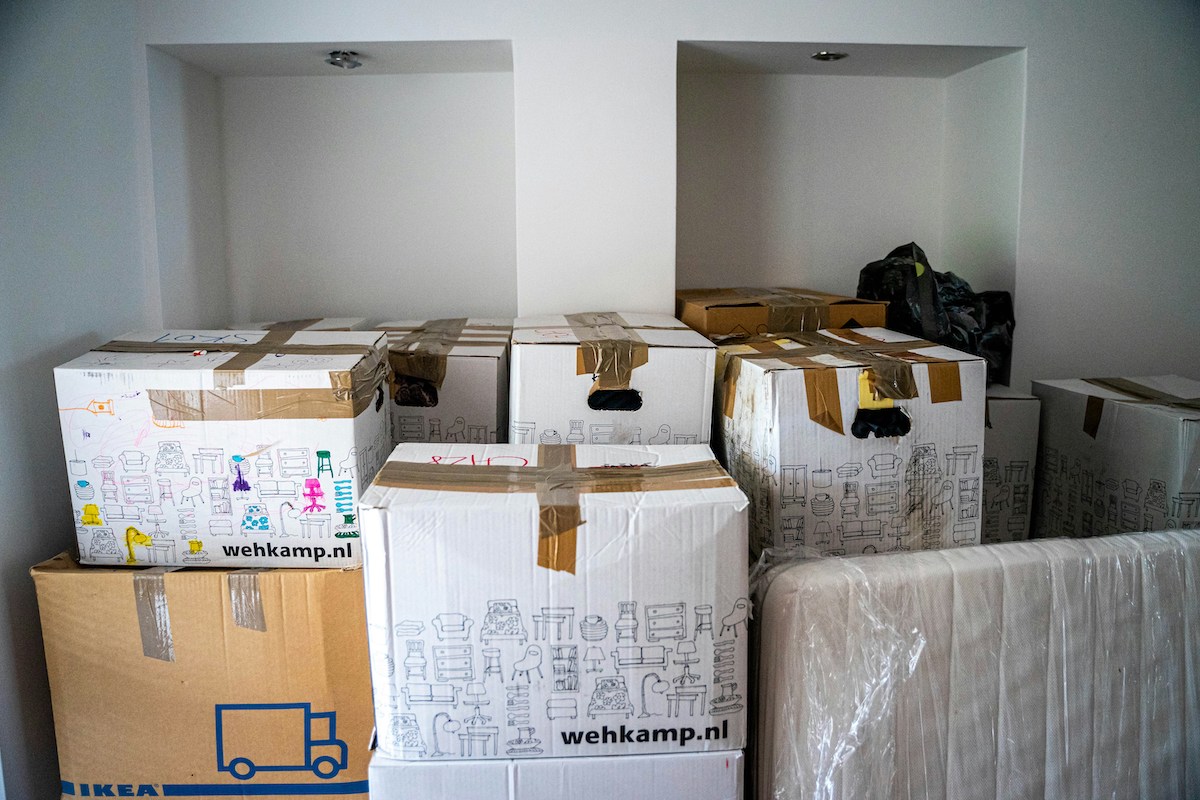News
Emigrating from the UK: A Step-by-Step Guide
28 March 2025

Emigrating from the UK is no small thing, yet Brits continue to seek out alternative shorelines. Perhaps it’s been something on your mind for several years now, maybe moving abroad is a fresh idea. Whether you’re being drawn by sunnier climates, better job opportunities, a lower cost of living or the desire for a new adventure, relocating to another country is an exciting yet complex process.
From securing the right visa to sorting out finances, healthcare, insurance, and housing, there are many practical steps to consider before making the big move. While the process can feel overwhelming, careful planning can make your transition smoother.
This guide will cover everything you need to know about emigrating from the UK, including the best destinations, visa requirements, financial considerations, one-way travel insurance, and key steps to help you settle into your new life abroad.
Why Do People Choose to Emigrate from the UK?
Before we get into the step-by-step guide of how to emigrate from the UK, let’s explore the why. Statista states, “In the year ending June 2024, approximately 479,000 people emigrated from the United Kingdom”.
But what motivates people to leave the UK behind? The reasons vary, from career progression to lifestyle changes, and each individual’s journey is unique. Here are some of the most common reasons why people choose to emigrate:
- Better job opportunities and career growth
- Improved quality of life
- Lower cost of living
- Warmer climate and lifestyle change
- Retirement abroad
- Political or economic concerns
- Family and relationships
- Seeking new adventures
What are your reasons for emigrating from the UK?

Step 1: Choosing the Right Country
Choosing the right country is one of the most important decisions when emigrating from the UK. It can affect your quality of life, career prospects, and overall happiness abroad. When considering where to move, you should take several factors into account:
- Cost of Living: Some countries are more affordable than others, especially regarding housing, groceries, healthcare, and entertainment. It’s crucial to consider how far your salary or savings will go in your chosen destination.
- Job Market: Certain countries offer more job opportunities, especially in highly demanded industries. It’s also important to research the ease of obtaining a work visa.
- Language: While English-speaking countries may be the most appealing for many UK emigrants, some may want to embrace a new language and culture. Countries where English is widely spoken or where you can easily learn the local language can make the transition smoother.
- Climate: The weather and overall climate can significantly affect your decision. For example, destinations with year-round sunshine might be more appealing if you’re looking to escape the UK’s grey skies.
- Quality of Life: Factors like healthcare, safety, education, and work-life balance contribute to a country’s overall quality of life. It’s essential to consider whether your chosen destination aligns with your lifestyle preferences.
Now, let’s look at some of the most popular destinations for emigrants from the UK, each offering distinct advantages based on these factors.
Australia & New Zealand – Skilled Worker Visas, Lifestyle Appeal
Australia and New Zealand are long-time favourites for Brits looking to emigrate. Both countries offer a high quality of life, with strong economies, well-regarded healthcare systems, and plenty of outdoor activities.
- Skilled Worker Visas: Australia and New Zealand have established points-based visa systems prioritising skilled workers in sectors like healthcare, IT, and engineering. The process can be competitive, but these countries offer excellent work opportunities for those with in-demand skills.
- Lifestyle Appeal: These destinations are hard to beat if you’re looking for a laid-back, outdoor-focused lifestyle. Think beaches, hiking trails, and year-round sunshine in many regions. However, it’s important to note that the cost of living in cities like Sydney and Auckland can be high, especially in housing.
Canada – High Quality of Life, Family-Friendly
Canada is one of the most welcoming countries for emigrants, and for good reason. It boasts a high quality of life, a robust job market, and an emphasis on family values.
- High Quality of Life: Canada is consistently ranked as one of the best places to live, thanks to its excellent healthcare system, low crime rates, and beautiful natural landscapes.
- Family-Friendly: The country is known for being inclusive and family-oriented. It offers a wide range of public services, including free healthcare and generous parental leave.
- Work Opportunities: Canada also has several immigration pathways for skilled workers, making moving easier for professionals. The demand for workers in technology, healthcare, and engineering industries remains high.
Spain & Portugal – Popular for Retirees, Golden Visas
Southern Europe is a favorite destination for many retirees to emigrate to from the UK, thanks to the warm climate, affordable cost of living, and a relaxed lifestyle. Spain and Portugal offer unique opportunities, especially for those looking to retire or start a new chapter in life.
- Retirement-Friendly: Both countries have attractive visa options for retirees. Portugal, in particular, is known for its Golden Visa program, which allows you to obtain residency by making a financial investment in the country.
- Golden Visas: Spain also offers a similar program, making it easier for foreign investors and retirees to settle.
- Cost of Living: Compared to the UK, both Spain and Portugal offer lower housing costs and affordable healthcare, making them attractive for expats looking to retire comfortably. However, large cities like Lisbon and Barcelona can still be pricey.
USA – Work and Investment Opportunities
The United States remains a top destination for those seeking work or investment opportunities. With vast industries, innovative tech hubs, and business-friendly policies, the USA continues attracting emigrants from all over the world.
- Work Opportunities: The USA offers numerous work visas, including the H-1B for skilled workers and the L-1 for intra-company transferees. Major cities like New York, San Francisco, and Austin have thriving tech, finance, and entertainment industries.
- Investment Opportunities: The USA’s EB-5 Investor Visa allows high-net-worth individuals to gain residency by investing in the economy, often in real estate or job-creating businesses.
- Diverse Climate: Whether you prefer the sunny beaches of California or the snow-capped mountains of Colorado, the USA’s diverse climate and geography offer something for everyone. However, healthcare can be expensive without insurance, and the cost of living in cities like New York or San Francisco can be very high.
United Arab Emirates (UAE) – Tax-Free Income, Expat-Friendly
The UAE, especially Dubai and Abu Dhabi, has become a hub for expats seeking tax-free income and business opportunities in a globalised, high-tech economy.
- Tax-Free Income: One of the UAE’s biggest draws is its tax-free income, which can be highly attractive for professionals, especially in sectors like finance, engineering, and healthcare.
- Expat-Friendly: The UAE has a large expat community, and the government actively supports newcomers through visa programs and other initiatives.
- Lifestyle Appeal: With modern infrastructure, luxury shopping, and world-class dining, the UAE offers a lavish lifestyle. However, the cost of living can be high, especially in Dubai. Additionally, the strict cultural norms and high temperatures may require some adjustment.

Step 2: Understanding Visa Requirements
One of the most crucial aspects of emigrating from the UK is understanding the visa requirements for your chosen destination. Each country has its own immigration laws, visa types, and application processes, so getting familiar with the specific requirements is essential before making plans.
Visa requirements vary depending on your destination, your reason for emigrating (e.g., work, family, retirement), and how long you plan to stay.
Types of Visas to Consider
- Work Visas: The most common route for those planning to work abroad is a work visa. Many countries offer work visas for skilled professionals in high-demand industries like healthcare, engineering, and IT.
- Student Visas: A student visa is required if you’re moving abroad to study. Many countries offer post-graduation work opportunities for international students, which can lead to permanent residency.
- Family Visas: If you have family members living abroad, you may be eligible for a family reunification visa. This lets you join your spouse, children, or parents in your new country.
- Investor Visas: Countries like the USA, Portugal, and Spain offer Golden Visa programs for individuals willing to make a significant financial investment, such as buying property or starting a business.
- Retirement Visas: For those looking to retire abroad, certain countries, such as Portugal and Spain, offer visas specifically for retirees, often with minimal income requirements and benefits like tax breaks.
Application Process: What to Expect
When emigrating from the UK, the visa application process can be lengthy depending on which country you plan to move to. Planning is essential. Here’s a brief overview of what to expect:
- Research the Requirements: Start by thoroughly researching the visa requirements for your chosen destination. Check government websites or consult an immigration expert to ensure you meet the criteria.
- Gather Documentation: Visa applications often require various documents, including proof of employment, educational qualifications, financial stability, health checks, and police clearances.
- Submit Your Application: Depending on the country, applications can often be completed online or submitted in person at an embassy or consulate. Be prepared for waiting periods ranging from a few weeks to several months.
- Wait for Approval: Once your application is submitted, you must wait for approval. Some countries may require an interview or additional documentation before making a decision.
- Prepare for Arrival: After your visa is approved, prepare for the next steps, such as finding housing, arranging travel, and securing health insurance.
It’s best to start early and give your visa applications plenty of time. Stay organised and ahead of deadlines. If you find the process confusing, seek professional help. Companies like Smart Steps To Australia can make the emigration journey less stressful.
Step 3: Financial Planning for Emigrating from the UK
Emigrating from the UK can be an exciting new chapter, but it also comes with significant financial considerations. Proper financial planning is essential to ensure that your move abroad is as smooth and stress-free as possible. From budgeting for the relocation process to understanding the cost of living in your new country, having a clear financial strategy will help you avoid unexpected costs and stay on track.
- Assess your financial situation. Before you start your emigration process, it’s crucial to examine your current financial situation. Start by assessing your savings, assets, debts, and potential sources of income once you’ve relocated.
- Budget for the move. Moving abroad involves various expenses, and it’s essential to be realistic about what it will cost.
- Understand the cost of living in your new country. The cost of living varies significantly from country to country, and even between cities within the same country. Understanding the cost of living in your destination will help you make informed decisions about your budget and lifestyle.
- Plan for taxes. When emigrating, one of the most important financial considerations is understanding how your move will affect your tax situation. Different countries have different tax laws, and it’s essential to be informed to avoid any surprises.
- Set up your finances in the new country. Open a bank account and transfer money.
- Bank up an emergency fund. Moving abroad can come with unforeseen challenges, and having a financial cushion can provide peace of mind as you adjust to your new home. Aim for at least three to six months’ living expenses as part of your emergency fund.

Step 4: Healthcare & Insurance Abroad
When emigrating from the UK, one of the most important factors to consider is how you’ll manage healthcare in your new country. While some countries offer robust public healthcare systems, others may require you to arrange for private health insurance. Understanding healthcare options and securing appropriate insurance coverage before you leave is essential to ensure your health and well-being are well taken care of abroad.
| Public Healthcare | Canada, Australia, parts of Europe | It may be free or require a contribution from residents. For example, Australia has Medicare, which provides free or subsidised healthcare for residents, while in Canada, healthcare is publicly funded but varies by province. |
| Private Healthcare | USA and the United Arab Emirates | You’ll need health insurance to cover medical expenses. Without coverage, healthcare costs can be extremely high. |
| Expat Health Insurance | Worldwide | If you’re living in a country without a public healthcare system or where you are not yet eligible for healthcare benefits, you’ll need an expat health insurance plan to ensure access to quality care. |
Travel insurance, including one-way trip insurance from Go Walkabout, is ideal for shorter stays or trips. However, for long-term stays or permanent residency, you’ll need health insurance that covers you on a more ongoing basis.
Emigration Platinum, Emigration Gold and Emigration Silver Policies
For those emigrating or leaving the UK for an extended period, Go Walkabout offers One-Way Trip Insurance policies that can help protect you during your journey. These policies are specifically designed for people travelling to their new home abroad and provide peace of mind during their transition.
- Comprehensive Coverage: Our one-way trip insurance offers extensive coverage, including emergency medical expenses, trip cancellation, and lost baggage. It’s ideal for travellers moving abroad, as it provides coverage from leaving the UK for up to 31 days after you arrive in your destination country, while you settle into your new home.
- Emergency Medical and Repatriation: One of the most crucial components of our one-way trip insurance is emergency medical and repatriation cover. Whether you’re involved in an accident or fall ill soon after you arrive, you’ll have access to 24/7 assistance, ensuring you receive the care you need. Repatriation services can also bring you back to the UK if necessary, which is an important safety net.
- Cover for Multiple Destinations: If your emigration journey includes multiple stops or destinations, Go Walkabout’s one-way trip insurance covers you for multiple legs of your journey. Whether you’re travelling to different countries before settling in your final destination or need coverage across multiple regions, we’ve got you covered.
Step 5: Finding Work and Housing
Once you’ve decided on a destination and taken care of your visa and insurance, the next step is finding a job and a place to live. These two factors will be crucial in helping you settle into your new country comfortably and ensure financial stability as you begin your new life abroad.
Down Under Centre can help find rental properties or jobs in Australia, reducing the stress of this step.
It’s important to note that some countries may require you to secure a job before applying for a work visa. Ensure you understand your job type’s visa requirements and start your job search early to avoid delays.
Buying property abroad as a UK citizen can be complicated in some countries. Renting is a good option while you are finding your feet.

Step 6: Shipping Belongings & Moving Logistics
One of the biggest tasks when emigrating is deciding how to move your belongings to your new home. Careful planning ensures a smooth relocation, whether you’re shipping furniture, personal items, or important documents.
Choosing a Shipping Method
There are several options for moving your belongings abroad, including sea freight, air freight, or international courier services. Sea freight is the most economical option for large shipments, but can take several weeks or months. Air freight is faster but more expensive, and international couriers are best for smaller packages.
Packing & Inventory
Proper packing is crucial to protect your items during transit. Consider professional packing services for fragile or valuable items. Creating an inventory of all your belongings is also important, as this will help with customs documentation and ensure everything arrives safely.
Customs & Import Regulations
Each country has different import regulations, and some items may be restricted or require special permits. Research the customs rules for your destination country and ensure you have all necessary paperwork to avoid delays.
Temporary Storage
If there’s a gap between your arrival and your permanent accommodation, you may need temporary storage for your belongings. Many shipping companies offer storage options, allowing you to store items until your new home is ready.
Step 7: Settling into Your New Life
Adjusting to life in a new country can be both exciting and challenging. From adapting to a new culture to building a social network, you can make your transition easier with these tips:
Adjusting to a New Culture, Making Friends, and Expat Communities
Embracing a new culture can take time, so it’s important to be patient and open-minded. Explore local traditions, customs, and social norms to better understand your new home. Joining expat communities can be a great way to meet people who understand the challenges of settling abroad. Often found online or through social groups, these communities offer support, advice, and friendship.
Learning the Local Language
If you’re moving to a country where a different language is spoken, learning the local language is a key part of settling in. Basic conversational skills can help you navigate daily life, build relationships, and feel more at home. Consider language classes, apps, or local meet-ups to practice and improve your language skills.
Handling Homesickness and Staying Connected with the UK
It’s normal to experience homesickness when you first move abroad. Stay connected with family and friends through regular video calls, social media, or old-fashioned postcards. Finding local British shops or pubs can also give you a taste of home. Over time, as you build new routines and friendships, homesickness tends to fade, and your new country will begin to feel like home.

Final Checklist for Emigrating from the UK
Emigrating from the UK is a major life decision that requires careful planning and preparation. From choosing the right country to managing visas, healthcare, and housing, each step brings you closer to starting a new chapter of your life abroad. By taking the time to research, plan, and seek guidance when needed, you can ensure a smoother transition and enjoy the exciting opportunities that come with living in a new country.
While the journey may be challenging, the rewards of exploring a new culture, career opportunities, and building a life in a different part of the world are well worth the effort. Remember, this is your adventure; with the right steps, you’ll find your new home abroad.
Related posts
We’re all going on a working holiday!
12 July 2012Read more
Places to Visit | Travel NewsLondon is the most highly-rated city destination
30 July 2012Read more
Misc | Special EventsA Travel Insurance Policy for Father Christmas
3 December 2012Read more
CompetitionsHidden Gems Travel Competition Entries
7 March 2013Read more